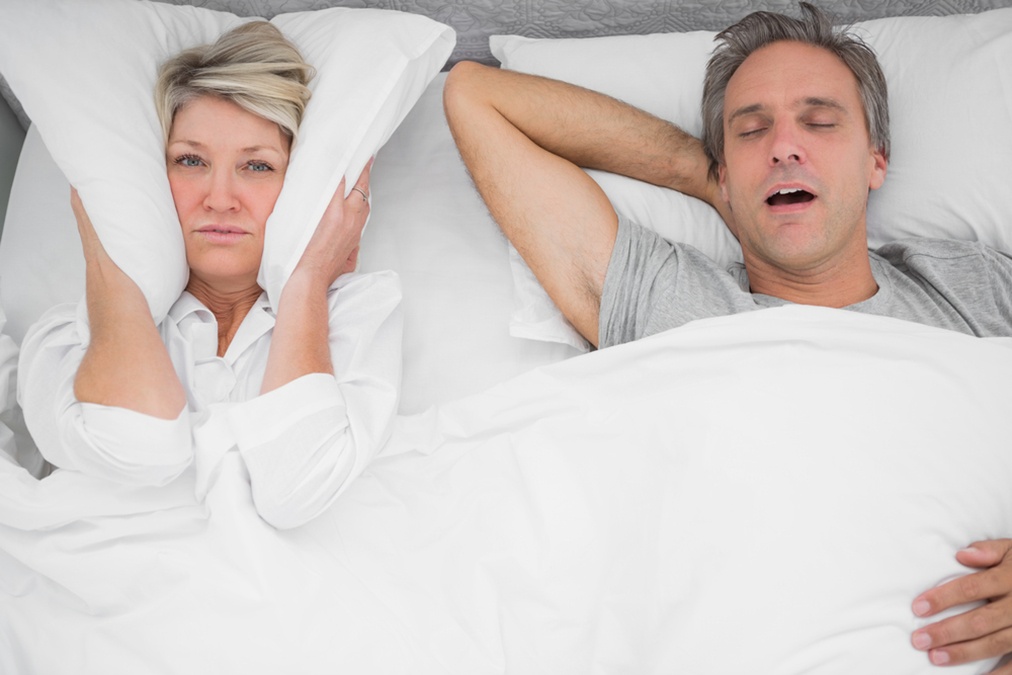 Most people with sleep apnea go undiagnosed for a prolonged period of time… and sometimes they are never diagnosed. This is not good as it is a life-threatening disease in many different ways.
Most people with sleep apnea go undiagnosed for a prolonged period of time… and sometimes they are never diagnosed. This is not good as it is a life-threatening disease in many different ways.
If you snore loudly, it’s very likely you suffer sleep apnea – even if you have never been diagnosed. In fact, most sleep experts treat snoring as a case of mild sleep apnea or undiagnosed sleep apnea.
The problem is that to diagnose sleep apnea properly, people have to spend a night in a sleep lab and would be plugged up several wires and tubes for the entire night. Not a very pleasant experience.
Until now that is! A new study has revealed a simpler way to diagnose sleep apnea 98% of the time. All it takes is a little device that you already carry with you everywhere.
A team of Thai scientists wondered whether it was possible to record sleeping sounds and diagnose snoring and sleep apnea severity from it.
They presented their study at the 2018 15th International Conference on Electrical Engineering/Electronics, Computer, Telecommunications and Information Technology (ECTI-CON).
To do this, they first recruited 49 study subjects, and asked them to sleep in the laboratory for one night in order to undergo a multichannel polysomnography assessment.
This included an EEG of the subject’s brain activity, their heart rhythm, their muscle activity, their eye movements, their blood oxygen, their chest wall, upper abdominal wall movements, and so forth.
With their polysomnograms results in hand, the researchers categorized them into four groups: 24 people that suffered from severe sleep apnea, 10 people who had moderate apnea, seven with mild apnea, and eight snorers with no sleep apnea.
During the sleep study in the laboratory, the researchers also recorded their subject’s snoring sounds and identified 33 different common snoring sounds.
Through the use of statistical measures, they identified the 10 most common sounds and investigated the precision in which they could predict which group each subject belonged to.
They found that they could accurately separate sleep apnea patients from snorers with only one of the sounds.
They could also divide their subjects into the four groups with an accuracy of 87.8 percent, which may not be as high as a whole sleep study, but would be more than sufficient for a preliminary diagnosis.
So, the future of diagnosing sleep apnea is not far away from becoming a simple phone app that records your snoring to send over to the sleep doctor.

 Overcoming IBD
Overcoming IBD Multiple Sclerosis
Multiple Sclerosis Banishing Bronchitis
Banishing Bronchitis Gum Disease Gone
Gum Disease Gone Overcoming Onychomycosis
Overcoming Onychomycosis Neuropathy No More
Neuropathy No More The Prostate Protocol
The Prostate Protocol Brain Booster
Brain Booster
 Ironbound
Ironbound
 Solution for Shingles
Solution for Shingles
 The Bone Density Solution
The Bone Density Solution
 The Ultimate Healing Protocol
The Ultimate Healing Protocol
 The Parkinson's Protocol
The Parkinson's Protocol
 The Chronic Kidney Disease Solution
The Chronic Kidney Disease Solution
 Overthrowing Anxiety
Overthrowing Anxiety The Fatty Liver Solution
The Fatty Liver Solution The Hypothyroidism Solution
The Hypothyroidism Solution
 The End of Gout
The End of Gout The Blood Pressure Program
The Blood Pressure Program
 The Oxigized Cholesterol Strategy
The Oxigized Cholesterol Strategy
 Stop Snoring And Sleep Apnea Program
Stop Snoring And Sleep Apnea Program
 The Arthritis Strategy
The Arthritis Strategy The Vertigo & Dizziness Program
The Vertigo & Dizziness Program The 3-Step Diabetes Strategy
The 3-Step Diabetes Strategy Hemorrhoids Healing Protocol
Hemorrhoids Healing Protocol The Erectile Dysfunction Master
The Erectile Dysfunction Master Weight Loss Breeze
Weight Loss Breeze The IBS Program
The IBS Program The Insomnia Program
The Insomnia Program The Migraine and Headache Program
The Migraine and Headache Program The Neck Pain Solution
The Neck Pain Solution The Menopause Solution
The Menopause Solution The Ejaculation Master
The Ejaculation Master The TMJ Solution
The TMJ Solution The Acid Reflux Solution
The Acid Reflux Solution The Fibromyalgia Solution
The Fibromyalgia Solution The Psoriasis Strategy
The Psoriasis Strategy